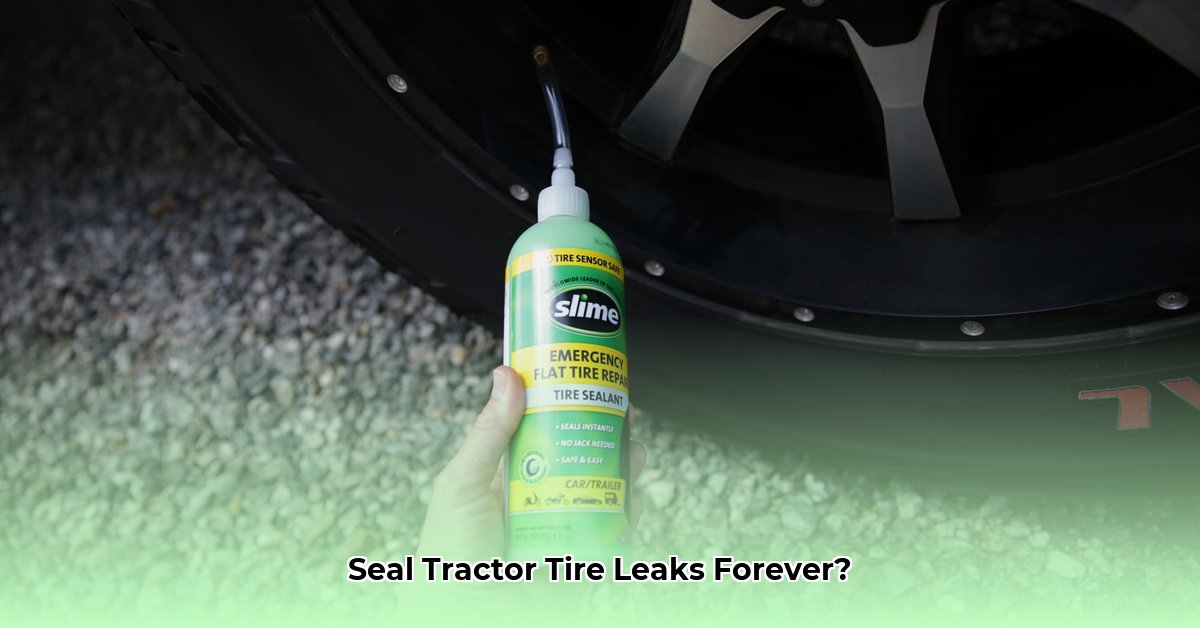
Slime for Tractor Tires: Keeping Your Wheels Rolling
Flat tractor tires are a farmer's nightmare. Downtime translates directly to lost revenue and a compromised harvest. Tire sealants, such as Slime, offer a proactive solution to prevent these costly interruptions. This guide provides a step-by-step approach to using Slime and other sealants, helping you choose the best option for your needs and maintain peak operational efficiency. For more in-depth information, check out this helpful resource.
The High Cost of Downtime: Why Flat Tires Hurt Your Bottom Line
Efficiency is paramount in agriculture. A flat tire disrupts the carefully orchestrated rhythm of farming operations, potentially leading to significant financial losses. The cost of replacing a tractor tire is substantial, and preventative measures are vital to minimize these expenses. While punctures are unavoidable, mitigating their impact is entirely within your control.
How Tire Sealants Work: A Proactive Approach to Tire Maintenance
Tire sealants, like Slime, act as preventative insurance for your tractor tires. These fluids flow into punctures as they occur, sealing the hole and preventing air loss. They represent a simple yet effective solution that can save you significant time, labor, and money in the long run.
Beyond Slime: A Comparative Analysis of Tire Sealant Options
While Slime is a popular and readily available choice, it's crucial to understand that different sealants offer varying levels of performance. Selecting the appropriate sealant depends on several factors, including the severity of the puncture, tire size, and budget. Let's examine some leading options:
| Sealant Type | Advantages | Disadvantages | Best Use Cases |
|---|---|---|---|
| Slime Sealants | Easy to use, widely available, cost-effective | Limited effectiveness against large punctures | Minor punctures, preventative maintenance |
| Sealants like TireJect | Superior performance with larger punctures, durable | Typically more expensive than Slime | Larger punctures, demanding terrains, heavy-duty equipment |
| Specialized Sealants | Tailored formulations for specific tire types/needs | Often require more specific application knowledge | Addressing particular challenges, maximizing tire lifespan |
Choosing the right sealant involves careful consideration of your specific needs and operating conditions. Consult with your local agricultural supplier for personalized recommendations.
A Step-by-Step Guide to Using Slime in Your Tractor Tires
Applying Slime or a comparable sealant is a straightforward process. Follow these steps for optimal results:
- Preparation is Key: Thoroughly clean the valve stem and surrounding area. Remove any debris that might impede sealant flow.
- Sealant Selection: Choose a sealant compatible with your tire size and type. Always check the manufacturer's guidelines before application.
- Adding the Sealant: Carefully follow the manufacturer's instructions. This typically involves shaking the container well and then inserting the sealant through the valve stem using the appropriate applicator.
- Inflation and Distribution: Inflate the tire to its recommended pressure. This ensures even distribution of the sealant within the tire.
- Post-Application Monitoring: Take a brief test drive to allow the sealant to fully distribute. Regularly monitor tire pressure to immediately detect any leaks or pressure drops.
Following these instructions diligently maximizes the effectiveness of the sealant and helps maintain optimal tire performance.
Frequently Asked Questions (FAQs) About Slime and Other Sealants
- How long does a tire sealant typically last? The lifespan varies depending on multiple factors, including the type of sealant, weather conditions, and tire usage. Regular checks are essential for optimal tire health.
- Can sealants repair all punctures? While sealants effectively address many punctures, exceptionally large holes might necessitate more extensive repair or replacement.
- Are tire sealants safe for my tires? Reputable brands undergo rigorous testing to ensure their compatibility and safety. Nevertheless, always consult your tractor's manual and the sealant's instructions.
- What is the typical cost of tire sealants? Pricing varies based on brand, volume, and point of purchase. However, the long-term cost savings from preventing tire failures often outweigh the initial cost.
A Holistic Approach to Tire Care: Proactive Maintenance Beyond Sealants
While sealants provide a valuable reactive solution, proactive maintenance remains paramount. Regular tire pressure checks are fundamental to preventing punctures and extending tire lifespan. Early identification and prompt attention to minor issues prevent them from escalating into major problems.
Implementing a comprehensive approach to tire care, which includes regular inspections, proper inflation, and appropriate sealant use, contributes significantly to maximizing operational efficiency and minimizing downtime. Proactive maintenance directly translates to a more productive and profitable operation.